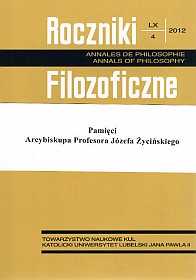Philosophical Context of Science
Abstract
Drawing on the analysis developed by M. Heller and J. Życiński in a work published 25 years ago, the paper shows that science is essentially „nested” in philosophy, because various philosophical assumptions are present in it. Five types of such assumptions are considered: (a) philosophical conditionings of empirical sciences; (b) philosophical themata; ( c) philosophical implications of empirical theories; (d) philosophical theses employed in scientific argumentation; (e) philosophical criteria of scientificity. Some possible interpretations of the first type listed are analyzed. They may be: (1) defined in terms of logical inference; (2) treated as the necessary or/and sufficient condition; (3) taken as presupposition (as understood in pragmatics); (4) interpreted psychologically as reasons for acceptance; (5) seen as the condition of understanding of scientific claims. The considerations developed in the paper show that those assumptions do not constitute a homogeneous group. Some are the a priori of science in that sense that rationality of doing science depend on their acceptance; some – for example, so-called ontological commitments – result from an acceptance of a certain theory; some others – interpreted, following E. McMullin, as non-standard epistemic factors – are a matter of choice and are historically changeable, what brings the issue of rational reasons for their acceptance; and still others are theses which belong both to science and to philosophy, what brings the issue of their mutual falsifiability. The presence of philosophical assumptions in science nevertheless indicates that neither methodological isolationism, nor attempts to subordinate one kind of cognition to the other capture correctly the relation between science and philosophy.
References
Agazzi, E., Dobro, zło i nauka. Etyczny wymiar działalności naukowo-technicznej, z ang. tłum. E. Kałuszyńska, Warszawa: Oficyna Akademicka OAK, 1997
Amsterdamski, S., Nauka a porządek świata, Warszawa: PWN, 1983
Douglas, H., „Inductive Risk and Values in Science”, Philosophy of Science, no 67, 2000, 559-579
Douglas, H., „Rejecting the Ideal of Value-free Science”, w: H. Kincaid, J. Dupré, A. Wylie (eds.), Value-free Science Ideals and Illusions, Oxford: Oxford University Press, 120-139
Heller, M., „Ontologiczne zaangażowania współczesnej fizyki”, w: tenże, Szczęście w przestrzeniach Banacha, Krakow: Znak, 1995
M. Heller, „Jak możliwa jest filozofia w nauce”, w: tenże, Szczęście w przestrzeniach Banacha, Kraków, Wydawnictwo Znak, 1995, 17-32
Heller, M., Życiński, J., “Epistemologiczne aspekty związków filozofii z nauką”, w: M. Heller, A. Michalik, J. Życiński (red.), Filozofować w kontekście nauki, Kraków, Polskie Towarzystwo Teologiczne, 1987, 7-16
Holton, G., „Perspectives on the Thematic Analysis of Scientific Thought”, w: tenże, Victory and vexation in
science: Einstein, Bohr, Heisenberg, and others, Cambridge 2003
Jodkowski, K., „Filozofia przyrody jako warunek sine qua non powstania i rozwoju nauki”, „Roczniki Filozoficzne” 2005, nr 2, 424—427
Kamiński, S., Nauka i Metoda. Pojecie nauki i klasyfikacja nauk, (red. A Bronk), Lublin: TNKUL, 19924
Longino, H., Science as Social Knowledge. Values and Objectivity in Scientific Inquiry, Princeton: Princeton Univesity Press, 1990
Łukasiewicz, J., O nauce, Lwów: Polskie Towarzystwo Filozoficzne, 1934
Łukasik, A., „Filozofia przyrody a nauki przyrodnicze”, http://bacon.umcs.lublin.pl/~lukasik/Filozofia_przyrody_a_nauki_przyrodnicze.pdf (dostęp 8.07.2012)
McMullin, E., „Racjonalne i społeczne parametry nauki”, Zagadnienia Naukoznawstwa, 4 (76), 1983, 521-536
McMullin, E., „Wartości w nauce”, w: S. Wszołek (red.), Refleksje na rozdrożu, Tarnów: OBI, 2000, 124-160
Novotny, H., Limoges, C., Scott, P., Gibbons, M., The New Production of Knowledge: The Dynamics of Science and Resarch in Contemporary Societies, London 1994
Novotny, H., Scott, P., Gibbons M., „'Mode 2' revisited: The New Production of Knowledge, Minerva 41, 2003, 179-194
Rudner, R., „The scientist qua scientist makes value judgement”, Philosophy of science vol. 20 nr 1, 1953 1-6
Woleński, J., „O tak zwanych filozoficznych założeniach nauki”, w: S. Butryn (red.), Z zagadnień filozofii nauk przyrodniczych, Warszawa: Polska Akademia Nauk. Instytut Filozofii i Socjologii, 1991
Woleński, J., „Czy nauka opiera się na założeniach filozoficznych i prowadzi do konsekwencji filozoficznych?”, w: S. Butryn, M. Czarnocka, W. Ługowski, A. Michalska (red.), Nauka w filozofii. Oblicza obecności, Warszawa: Wydawnictwo IFiS PAN, 2011, 13-31
Copyright (c) 2012 Roczniki Filozoficzne

This work is licensed under a Creative Commons Attribution-NonCommercial-NoDerivatives 4.0 International License.





